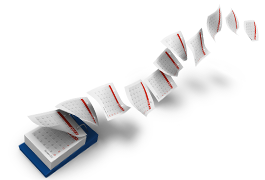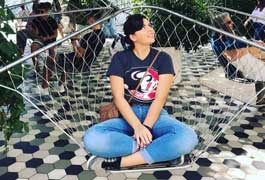Choosing a Research Advisor
If graduate school is in your plans, research most likely is too. In MS and PhD programs, you will propose and conduct independent research under the guidance of a research advisor in your field of interest. As a result, choosing the right research advisor is essential to your success in the program and in your career. Although research isn’t emphasized in MA and professional science master’s programs, advisors can still play a key role.
Choosing a research advisor depends on your scientific interests, your career goals, and—most of all—your personality and preferred working style. Everyone is different, so we thought it best to ask students to describe their individual experiences selecting the right research advisor for them.

Syeda Tajin Ahmed
Chemical engineering
4th year, PhD program
University of Illinois at Urbana-Champaign
I wanted to work for someone who is doing impactful research in the field of interfacial science. I also was mostly interested in doing experimental work. Working toward a PhD is a long-term commitment, so I wanted to keep an open mind about the person I was going to work for. Therefore, matching personality and good work ethics were important criteria for me.
At my university, they arrange a visiting weekend for accepted students to get acquainted with the faculty and resources available on the campus. As an international student, however, I couldn’t enjoy that opportunity.
[When the academic year started] all the professors at the department I chose gave talks about available research projects as well as current/ongoing project. This gave us an opportunity to explore options (computational vs. experimental or both, bio-concentrated or catalysis/reaction engineering, etc.) We were also encouraged to talk to the graduate students from the research groups we were interested in. This allowed us to understand the lab/group culture.
After that, we were told to talk to several professors whose work we were interested in and then make a list of our preferences. The professors also listed their preferences after talking to us. Then the department matched us to our top three choices.

Muhammad Shamim
Chemical engineering
1st year, Master’s of Engineering
Keck Graduate Institute
Here at Keck Graduate Institute, you apply for school and once you're accepted then you choose your research advisor. I chose my research advisor, Dr. Hu Zhang, based on his previous research in bioprocessing. I was really interested in learning about how the drug formulation works, and Dr. Zhang was the perfect advisor for it.

Isaiah Speight
Inorganic and organic chemistry
4th year, PhD program
Vanderbilt University
I looked for an advisor who shared a joy and energy similar to my own but also one who I felt would support my goals both in and out of the lab. Finding an advisor that matches your communication style is also key to your growth. Some advisors have open-door policies, and some are a little more hands-off and expect you to reach out when you have a question – it’s important to know what style you’d work best with.
Also, take note of the way a potential advisor listens to you when you talk about your research and professional goals. Keep an eye on how they interact with the younger and older grad students as well as postdocs. This will help you make an informed assessment about whether this is someone you are comfortable working with for years to come.

Annabelle Lolinco
Chemical education and physical chemistry
3rd year, PhD program
Iowa State University
I was very clear to myself and potential advisors about the kind of structure I need to do well both in the lab and as a person. I like having a mentor-mentee relationship that allows me to open up to my advisor, particularly because I knew I would have a delicate family situation in the background while pursuing my graduate degree.
My graduate program is (perhaps) unique in that I would be receiving a master's along the journey of getting a PhD, and the major professor (or main advisor) was different for each degree (physical chemistry and chemical education, respectively). I had primarily chosen my graduate school after speaking with my PhD advisor, Dr. Tom Holme, particularly due to our shared interests in research and his willingness to help me craft projects suited to my interests.
When it came time to pick major professors alongside my cohort, which meant focusing on my master's major professor (Dr. Theresa Windus), I wanted to make sure my master's major professor was: (1) okay with my short-term stay in the group, (2) would be willing to be on my doctoral committee, and (3) was interested in fostering my professional development. We ended up getting along great, as we both valued time away from work, our families, and delicious food, something I'm always happy to talk about since I do a lot of cooking.
While I didn't schedule to meet with Dr. Windus at the Open House I went to, I got to meet her and one of her senior graduate students over lunch, and, honestly, that genial experience resonated with me. I connected with her when I officially started, and the first impressions still held strong, plus she was very forthcoming about what projects were like and what was needed to be a part of her group. So, that's how I ended up choosing who I would work with on my graduate school journey.

Scott Crawford
Analytical, inorganic, materials chemistry
1st year, Postdoc
National Energy Technology Laboratory
In many ways, I was somewhat unprepared for graduate school. Unlike many of my peers, I did not have a good sense of what type of research I wanted to do, nor did I have a list of research groups that I was interested in joining. I knew from my undergraduate work that I enjoyed working in a lab, and I had a vague sense that I wanted to conduct research broadly within the field of analytical chemistry. By coincidence, one of the professors with whom I wanted to meet was unavailable during a recruiting event, and instead I met with a relatively new professor. I was not familiar with her research but was immediately struck by her enthusiasm and her ability to explain her research in a very accessible way. She reached out to me several times during the summer about working in her group, which was important to me because it indicated that she was invested in me and my success.
Once I joined her research group, she was extraordinarily helpful in my career development. She encouraged me to attend numerous conferences, apply for fellowships, co-organize an ACS symposium at a national meeting, and even pursue an internship within the department of energy during my time in her research group, which led me to obtaining my current position at the National Energy Technology Laboratory. Having a mentor who was knowledgeable about professional development opportunities and who took the time to work with me one-on-one on every publication, presentation, and fellowship application was crucial to my success.
I would encourage students to not only speak with prospective research advisors, but also to reach out to current students within that research group to get their perspective on the strengths and weaknesses of the advisor. It is also helpful to look at the alumni of research groups to see if their career paths match your own career goals.

Dylan Brown
2nd year, MS program
North Carolina State University
I chose my advisors based on a few key things. Advising style is perhaps the most important. Ask potential advisors how they run their lab. Lab environment is similarly important. Do lab members hang out with each other? Do lab mates help each other? Being in a good environment really helps keep up motivation. Publication track record is another one. If you are interested in staying in academia, like myself, publishing as much as possible can be important. Lastly, I prefer an advisor I can have a conversation with or grab lunch with occasionally. I find it makes the work experience more enjoyable.

Sandip De
Inorganic chemistry
4th year, PhD program
Saha Institute of Nuclear Physics
A supervisor is like the coach of a football team who gives the directions to his students. Students carry forward their own research; a supervisor only helps them find the appropriate path by discussing with the team. In our institute, we look at supervisors as our senior colleagues rather than as teachers. We approach them for advice whenever we face difficulties. That is why it is extremely important to have a research advisor who can give appropriate time to lab members with a friendly approach.

Mayukh Bhadra
Inorganic chemistry
5th year, PhD program
Johns Hopkins University
I have heard that the relationship with your graduate mentor for 5-6 years is like a marriage: it can make or break you, and that is mostly correct. Choose the best person for you, not the most famous scientist. A combination of both is extremely rare, and I am fortunate to experience that. But that may be difficult to find. Right from the time you talk to a few potential advisors (yes, even from the first day of the department Welcome BBQ), try to gauge their personalities, how you vibe with them, and how students of other groups talk about them.




